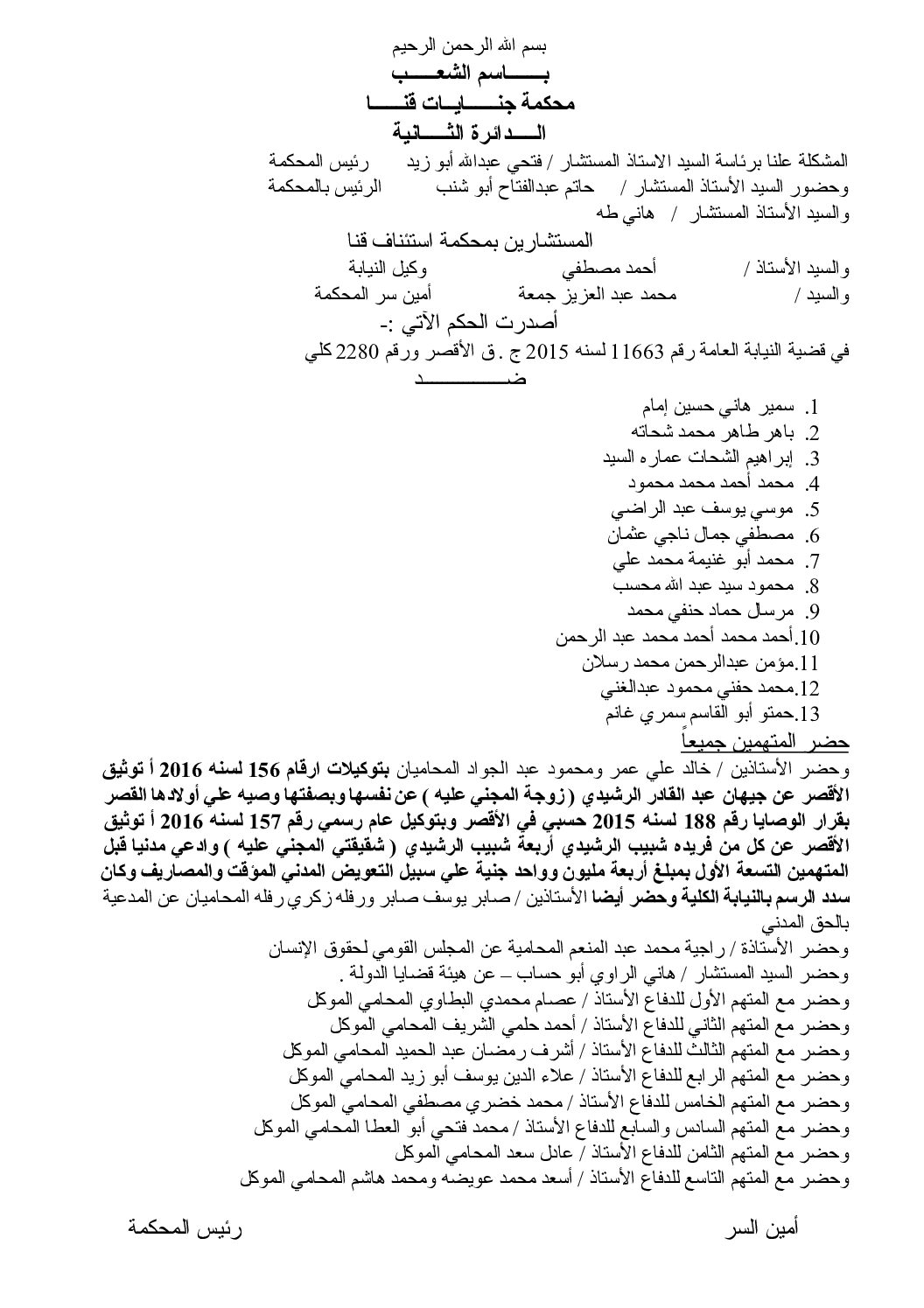Egypt UPR Briefing before the Human Rights Council: Updated

Romania called on Egypt to ensure respect for religious freedom for all, and for freedom of association.
Korea called on Egypt to promulgate a fair law regulating the work of associations and civil society.
Philippines called on Egypt to amend the Labor Act to protect domestic workers from exploitation and abuse.
Norway expressed deep concerns about freedom of expression and the laws regulating the work of non-governmental organizations (NGOs), and about human rights defenders and the Protest Act.
Morocco paid tribute to the efforts exerted by Egypt and called it to train police forces on human rights.
Montenegro said: “There is an urgent need for reconciliation, which is impossible with the large-scale judicial procedures and the continuation of death sentences.”
Mexico called on Egypt to ensure fair trial, judiciary independence, freedom of expression, and the right to form associations through a legal framework.
Mali called on Egypt to raise the standard of living of Egyptians.
Canada called on Egypt to review all the laws related to public gatherings in order to be in line with international law.
Lithuania called on Egypt to undertake investigations on the use of force against demonstrators, review the Penal Code, and to recognize the independent trade unions in Egyptian law.
Latvia said that challenges were still facing gender equality and called on Egypt to withdraw its reservations on CEDAW Agreement
Kazakhstan called on Egypt to amend legislations to conform to the Constitution, and to achieve economic and social rights, particularly through promotion of social protection.
Israel appealed to Egypt to release and compensate for an Israeli citizen being held in Egypt, and praised the terrorism-fighting efforts
The Ministry of Justice: “Egypt has seen a surge in press freedom. the right to expression is not subject to restrictions by the Constitution, and the right to publish and exchange information is ensured, as well as the right of the press.”
Ireland called on Egypt to undo the NGOs Bill, including restrictions on funding and activities. It expressed deep concerns about the due process, including the death penalty, and called for independent investigations.
Indonesia called on Egypt to eliminate illiteracy for all, and strengthen the framework of cooperation with civil society, and to address all the challenges in the field of human rights in Egypt.
Representative of the Public Prosecutor’s Office, Mohammed Khalaf: “The death sentences require judges’ consensus, along with the right of Mufti to intervene and the President to pardon the convicted. Furthermore, the death penalty had its own governing laws. The Protest Act is under review and its constitutionality is considered by the court. The Protest Act is applied only to non-peaceful demonstrators or to those demonstrations organized without prior notice. All detainees were arrested and convicted either for protesting without prior notice or for the use of force.”
Egyptian Delegation’s Representative of the Ministry of Interior:
Interior Minister Assistant for Human Rights: “Egypt has no anti-terrorism law or any emergency measures applied against citizens because of the war on terror.”
Foreign Minister Assistant: “Your reference to the allegedly excessive use of force against demonstrators is premature because investigations are still underway in Egypt, and Mubarak’s trial is still in progress.”
Interior Minister Assistant for Human Rights: “Torture is not systematic, it is an individual act, and detention facilities are open.”
France called on Egypt to respect the freedom of assembly, and to ensure the rights and freedoms of organizations without any hindrances, as well as fighting terrorism while respecting human rights.
Finland expressed its concerns about freedom of assembly and expression, and its deep concerns about the delicate position of civil society organizations and human rights defenders.
Denmark called on Egypt to allow NGOs to operate without hindrance, including access to finance and the ability to found organizations with notice only. It expressed deep concerns about the legislations of assembly and associations, which is inconsistent with the Constitution and offer no protection for human rights.”
Switzerland called on Egypt to ensure protection to all detainees from torture and ill-treatment, and access to all places of detention, including military detention areas.
Cuba recommended that Egypt initiate legislative and administrative reforms to combat corruption.
Croatia called on Egypt to adopt legislations that facilitate the functions of NGOs working in Egypt.
Costa Rica expressed its fears of imposing excessive restrictions on peaceful assembly and arbitrary arrests. It recommended lifting restrictions imposed on NGOs.
Congo paid tribute to the Egyptian efforts.
China paid tribute to the Egyptian efforts.
Armenia recommended that Egypt continue the efforts exerted to protect children from abuse and exploitation and to have the right of access to adequate and proper education.
Brazil recommended that Egypt ratify the Rome Statute in order to participate in the International Criminal Court, and that the fight against terrorism be consistent with international human rights standards.
State of Bhutan recommended that Egypt reduce poverty and focus on anti-poverty measures in rural areas.
Egypt Representative Ambassador Hisham Badr
Ambassador Hisham Badr: “Please check the information before speaking out. Some may have misread the title of this session. Egypt initiated bills for unions, associations, and for governing the right to peaceful strike and others. Egypt initiated to modify the definition of torture in the Penal Code in order to be consistent with international law. Notifying the Ministry of Social Solidarity for registration is only made for communication, and to open a fruitful interactive dialogue with Associations. No final draft of the Association Act has been made. Although we have consulted with hundreds of associations, we left the whole issue to the new parliament. You have false information on associations: there are 47 thousand associations operating in Egypt and both the laws and the Constitution deal with the role of civil society organizations.”
Egypt Representative Mervat Tallawy
Tallawy:”The Brotherhood Constitution allowed child labor. Of the challenges facing women’s rights are transforming the Constitution to laws and legislations and then applying them. Despite the success, there are many challenges, especially in the field of culture because of the Muslim Brotherhood’s rule. We continue to issue national ID so that women can get their economic rights. We have the political will to eliminate violence against women—al- Sisi paid a visit to the harassment victim in hospital. The Constitution provides 25% of the seats of municipals for women. We have seen two revolutions in Egypt and a new constitution. Good governance and the rule of law are the key to the realization of human rights.”
Australia expressed concerns about freedom of expression; it recommended the abolition of Protest Act, and the amendment of Penal Code to ensure freedoms.
Ukraine recommended that Egypt should: 1. continue efforts to eliminate all forms of violence against women; 2. protect women and girls and initiate education reform; 3. pursue policies to achieve economic, social and cultural rights.
Zimbabwe recommended that Egypt increase human rights education for state employees and security personnel.
Many states encouraged Egypt to open a regional office for the High Commissioner for Human Rights in Egypt.
Yemen paid tribute to the achievements of human rights in Egypt, and its success in national reconciliation. It called on Egypt to continue the same policies.
Argentina called on Egypt to fight impunity for significant violations of human rights.
UK expressed concerns about the detainees of consciousness, the Association Act and the increasing number of casualties.
United States recommended that Egypt abolish Protest Act, investigate the use of excessive force by the security forces, release peaceful demonstrators, and hold fair trials.
UAE expressed its close ties with Egypt and called for strengthening the private sector and training police forces.
Tunisia called for Egypt to provide an appropriate environment for the work of journalists and human rights defenders.
Sweden called for Egypt to review the Protest Act and the Penal Code to ensure freedoms, and the immediate release of prisoners of consciousness. It expressed deep concerns about the laws that target civil society activities and human rights defenders
Spain called for Egypt to change the Associations Act in order to ensure the right to organize.

